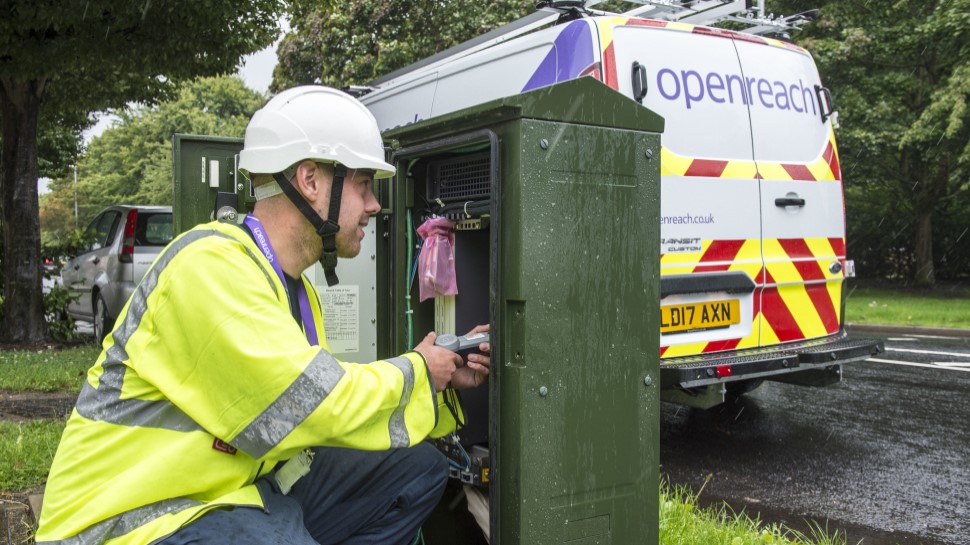
If an extended and unexpected broadband outage stops you from working or enjoying your favourite TV shows, then it’s only right that you receive compensation. After all, when you take out a broadband deal, you expect it to provide you with continuous coverage.
Well, the good news is that Ofcom’s automatic compensation scheme is designed to help you get money back from your provider when your broadband is out of service. Here’s everything you need to know about the automatic compensation scheme, including how it works and which providers are signed up.
What is the Ofcom automatic compensation scheme?
The Ofcom automatic compensation scheme was first introduced in April 2019. Officially known as the ‘Ofcom automatic landline and broadband compensation scheme’, it’s designed to compensate customers who experience any of the following from their provider:
- Delayed repairs following a loss of service.
- Missed and rescheduled appointments.
- Delays with the start of a new service.

Which providers are signed up to the scheme?
The scheme is voluntary, so not all providers have signed up. That said, many of the country’s most popular providers have opted in. This means that most customers are eligible to receive compensation for the above reasons.
All of the following companies have signed up to the scheme. So, if you receive a broadband connection from any of these internet service providers, you’re covered:
- BT (joined 1 April 2019)
- EE (joined 4 May 2021)
- Hyperoptic Broadband (joined 28 October 2019)
- NOW Broadband (joined 1 April 2019)
- Plusnet (joined 4 May 2022)
- Sky (joined 1 April 2019)
- TalkTalk (joined 1 April 2019)
- Utility Warehouse (joined 17 February 2020)
- Virgin Media (joined 1 April 2019)
- Vodafone (joined 3 November 2021)
- Zen Internet (joined 1 April 2019)

When am I entitled to compensation?
If you’re with one of the providers listed above, then you will automatically receive compensation in any of the following scenarios:
- You’ve been without a working broadband connection for two full working days.
- An engineer does not turn up for a scheduled appointment.
- Your scheduled engineer appointment is cancelled by your engineer or provider with less than 24 hours' notice.
- Your provider has not started your service on an agreed date.
Unless a specific exception applies, the scheme requires your provider to pay automatic compensation to you even if the problem is caused by an event beyond either your or their control. Examples include extreme weather, strikes and third-party acts.

How much compensation will I receive?
How much compensation you’ll receive depends on the issue you experienced and how long you experienced it for. However, all providers who are signed up to the scheme will pay the following base rates:
- £9.33 for each calendar day that the service was not repaired.
- £29.15 per missed appointment.
- £5.83 for each calendar day of delay for the service going live, including the missed start date.
These will change on 1 April 2024 and they’re calculated in line with inflation, which is based on the Consumer Price Index (CPI) as of 31 October 2023.
It’s also important to know that if you experience issues with both your broadband and landline at the same time, you will only receive compensation for one of these services.

How and when will I receive the compensation I’m owed?
If your engineer misses your appointment or there’s a delay when activating your broadband or landline service, you will automatically receive compensation from your provider and there is no need to take any action.
However, if your broadband or landline stops working, you’ll need to report the problem to your provider. Then, if the service has not been fixed after two full working days, you will automatically receive compensation for each day the fault remains unfixed.
Any money you’re owed will be added as a credit to your account within 30 days of a missed appointment or the activation of the service. If you’ve experienced a total loss of service fault, you’ll receive the credit within 30 calendar days of the service being fixed completely.
What if I don’t receive the compensation I’m owed?
If you believe you’re owed compensation but you haven’t received any money from your provider, then you should notify them immediately. If you cannot reach a resolution with your provider via customer support, then you need to raise a formal complaint with them.
If your formal complaint remains unresolved, then you can escalate the matter to an Ofcom-approved alternative dispute resolution (ADR) service. An ADR acts as an independent middleman to resolve disputes. Every provider is legally obliged to be a member of an ADR that has been approved by Ofcom.

Are there any exclusions?
Please be aware that you won’t be entitled to compensation if you caused the issue. For example, if you cancelled your appointment with the engineer, you changed the date of the appointment or you damaged the router in your home.
You also won’t be eligible for compensation if you breach your contract or you prevent the issue from being resolved. You may do this by turning down an engineer appointment, for example.
Providers can also put a cap on the amount of compensation they pay out. After 30 days of an automatic compensation payment occurring, they can serve a cease notice to let you know that automatic compensation payments will stop after a further 30 days.
Following this, your provider will need to take reasonable steps to provide a suitable alternative service. If they are not able to give you a suitable alternative, you will still be entitled to automatic compensation under the scheme.
If a provider claims an exception to paying automatic compensation, Ofcom expects them to clearly communicate the reasons why they have done so to you. They’re also expected to act in your best interests. If they’re not paying compensation for legitimate reasons and you’re left without service, Ofcom says that you should not be charged for any service you’re not receiving.
Frequently asked questions
What is a total loss of service?
A total loss of service is an unplanned outage to either your broadband or landline service.
A total loss of phone service occurs when you are unable to make or receive calls. Meanwhile, a total loss of broadband service occurs when you cannot access the internet on any of your devices.
If a total loss of service is confirmed and is not fixed by 11:59 pm on the second full day after you report it, you will receive automatic compensation.
Can I report a loss on behalf of someone else?
Sadly not. The billpayer must contact their provider directly if there is a problem with their service.
How long does it take to fix most service issues?
Most faults to broadband and landline services are resolved within 48 hours. If yours cannot be fixed within this timeframe, you will receive compensation automatically.
Can I cancel my contract and still receive compensation?
Yes. If you cancel the broadband or landline service with a provider who is part of the scheme, you can still receive compensation as long as you meet the criteria mentioned above.







